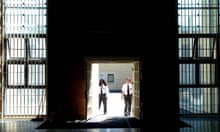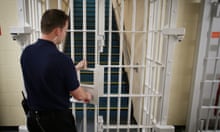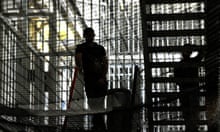The benefits of chess have long been extolled for retaining mental agility and as an escape from boredom, making it the perfect pastime for prisoners confined to four walls.
So the decision to grant inmates at two prisons in England permission to play competitive chess in an international tournament for the first time, allowing them direct access to the internet to make their moves from prison computers, has been lauded by campaigners.
Access to the internet is severely restricted in UK prisons and largely limited to education. But the Ministry of Justice has approved prisoners from the category B HMP Wandsworth in London and the category D open prison HMP Hollesley Bay in Suffolk to take part in the first Intercontinental Online Championship for Prisoners.
On a previous occasion, prisoners were indirectly allowed to play against online opponents. But security concerns meant they were not allowed to access the computers themselves. Instead, prison officers and volunteers inputted and relayed the moves for them. With just 10 minutes permitted in a game, this time-consuming method proved impractical and they lost all their matches.
This time they can make their moves on the computers themselves.
The four-man England team are all members of prison chess clubs, set up by the UK charity Chess in Schools and Communities (CSC). The charity has been working with prison authorities and the technology provider Novus to ensure the games are played securely.
As part of the two-day event, starting on Wednesday, the England team will take on inmates from prisons in 31 countries including the US, Russia, Croatia, Portugal and Trinidad and Tobago. The tournament will be played under the auspices of the International Chess Federation.
An MoJspokesperson said it was an exception and confirmed it was understood to be the first time prisoners have been permitted to take part in an online competition. It comes as chess enjoys increased popularity, due in part to the hit Netflix TV series The Queen’s Gambit.
CSC’s prisons coordinator, Peter Sullivan, who has run a thriving chess club at HMP Wandsworth for more than three years, has trained the England team. Its captain is the CSC chief executive, Malcolm Pein, an international master.
Pein said the charity’s ambition was to establish a chess club in every prison and young offender institution. He said: “Chess instils mental self-discipline, problem-solving skills and the ability to concentrate. It has a positive effect on behaviour as it relieves boredom and was a lifeline to some prisoners during lockdown.
“At Wandsworth there are games of chess being played all day long. For some prisoners it has relieved the isolation they’ve felt inside by being able to enjoy a shared activity with other prisoners that crosses all language and cultural barriers.”
Of the international competition, Pein said: “Our prison team has been preparing for six months and they are highly motivated and excited by the prospect of playing the Russians. If we get to the final we just have to hope that the internet connections hold up.”
From inmate to checkmate
The most famous chess-playing inmate was the convicted murderer Claude Bloodgood, who would have qualified for the US championships had he not been serving a life sentence for killing his mother. Bloodgood gamed the United States Chess Federation system by playing thousands of games against fellow inmates, nearly all of which he won. His success against this closed pool of players, many of whom he had taught himself, secured him one of the highest chess ratings in the US. He also authored a chess book on an offbeat and aggressive chess opening entitled The Tactical Grob. He reportedly played a number of chess games against the actor Humphrey Bogart, who was a good amateur player.
Natan Sharansky, a human rights activist who campaigned for the right of Jews to emigrate from the Soviet Union to Israel, was sentenced to life imprisonment in 1977 in Russia on a fabricated charge of spying for the Americans. The child chess prodigy spent nine years in prison. Half of that time was spent in solitary confinement and for more than 400 days he was locked in a punishment cell where he was forbidden to read or write. He played chess games in his head to keep himself sane, moving for both sides, white and black. “Thousands of games – I won them all,” he said.










